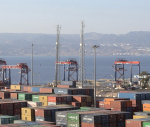You are here
Why US Tech giants need Africa
May 26,2023 - Last updated at May 26,2023
By Nate D.F. Allen and Nanjira Sambuli
WASHINGTON, DC/NAIROBI — Last year, Google’s Equiano undersea cable began conveying terabytes of data per second to and from African shores. Valued at $1 billion, Equiano stretches from Western Europe to South Africa and has 20 times the capacity of the previous cables that served the continent. According to Google projections, the new cable has the potential to transform Africa’s economy by creating millions of jobs, reducing data costs by nearly 20 per cent, and enabling a fivefold increase in internet speeds.
Other prominent US-based tech companies are also investing heavily in Africa. Amazon is in the midst of constructing its African headquarters in South Africa, while Microsoft recently launched an initiative to bring Internet access to 100 million Africans by 2025. Meanwhile, Meta (formerly Facebook) is building 2Africa, an undersea cable expected to be the world’s longest when it is completed in 2024.
The impetus for these investments is the growing recognition that the future of America’s technology industry hinges on expanding its African customer base. Today, a little over a third of Africa’s 1.4 billion people use the Internet, representing a small fraction of the world’s Internet users. But the continent’s population is projected to reach 2.5 billion by 2050, one-quarter of the global total. The vast majority of Africans are expected to become Internet users by then, offering tech companies opportunities that no other region can match.
Still, there is no guarantee that the investments made by Google and other US tech companies will pay off. In recent years, foreign competitors, particularly China-based firms, have also recognised Africa’s immense potential for the technology sector, leading to intense competition for market shares.
Currently, no single actor dominates African markets. Whereas Chinese companies lead in some sectors, such as telecommunications hardware, US companies prevail in software platforms, operating systems, and search. Meanwhile, African-owned fintech companies and startups are growing rapidly, and the continent’s undersea cables and data centers are managed by a diverse set of local and remote enterprises.
The most persistent challenge facing Big Tech firms in Africa is their ignorance of and disregard for Africans’ preferences and needs. For example, some US analysts have expressed concern about the rise of Chinese companies such as Transsion, which manufactures nearly half of Africa’s smartphones. But the main reason companies such as Apple and Google struggle to compete is that their products are priced as luxury goods and are ill-suited for consumers in low-income countries. The base price of the iPhone 14, the top-selling phone in the United States, is $799, nearly half of Sub-Saharan Africa’s GDP per capita. Transsion’s phones, by contrast, sell for as little as $20.
Likewise, data localization is widely supported by African governments, researchers, and citizens. But Big Tech companies vehemently oppose efforts to store data on African citizens within their countries of origin.
To be sure, data localisation is not always cost-effective and could be used by governments to undermine civil rights. But studies commissioned by the Internet Society show that efforts to localise Internet traffic in Nigeria and Kenya have reduced prices, decreased latency, and fueled the growth of the local tech ecosystem. Conversely, as Nima Elmi observed, Big Tech’s approach effectively perpetuates African countries’ status as consumers of “foreign tech innovations that are developed using their own data and then sold back to them”.
Big Tech firms’ labour and recruitment practices are another example of their disregard for Africa’s needs and interests. At the top end of the pay scale, African policymakers are concerned that tech giants’ tendency to poach top talent will undermine the growth of their domestic industries. Meanwhile, these companies face legal action for subjecting content moderators, many of whom are based in Nairobi, to traumatising experiences and inadequate wages.
Moreover, the proliferation of disinformation and incitement on social media has severely eroded the reputation of US-based platforms like Facebook, which has fueled violent conflict in Ethiopia and provided fertile ground for extremist groups such as the Al Qaeda-backed Al Shabaab. For years, Facebook ignored organised criminal groups’ use of its platform to lure Africans into domestic servitude. The company finally acted only after Apple threatened to remove Facebook and Instagram from its app store.
Given Big Tech’s record of ignoring and neglecting Africans’ needs and concerns, it is no wonder that African governments have begun to explore alternatives. Nigeria, for example, imposed a seven-month ban on Twitter in 2021, lifting it only after the company agreed to open a local office, pay taxes, and cooperate with national security agencies. Other countries, such as Kenya, have threatened similar bans.
With their unparalleled expertise and world-class technology, US companies are well positioned to benefit from the growth of Africa’s tech market. But to maximise this opportunity, they must address the needs of African users. Moreover, establishing stronger partnerships with the burgeoning African tech industry could greatly benefit these companies, enabling them to tailor their technologies to the preferences of underserved users and mitigate the impact of disinformation. By fostering relationships with Africa-based researchers and civil-society groups, US tech companies could support the creation of a healthy digital ecosystem that promotes prosperity, security, and accountability for all users.
Over the past few years, Big Tech firms’ failure to address privacy concerns and combat disinformation has prompted a growing debate about the apparent conflict between their professed values and their bottom lines. But to succeed in Africa, US-based tech companies must recognise the falseness of this dichotomy. While investing in African businesses may yield financial rewards, investing in African citizens is the key to unlocking the continent’s vast economic potential.
Nate D.F. Allen, associate professor of Security Studies at the Africa Centre for Strategic Studies, is a non-resident research fellow at Stellenbosch University in South Africa. Nanjira Sambuli, a Ford Global fellow, is a technology and international affairs fellow at the Carnegie Endowment for International Peace. Copyright: Project Syndicate, 2023.













